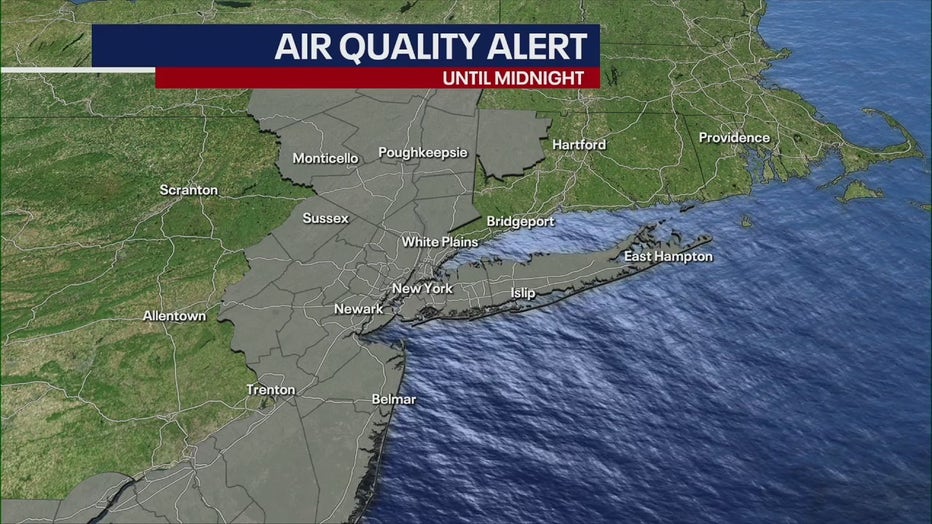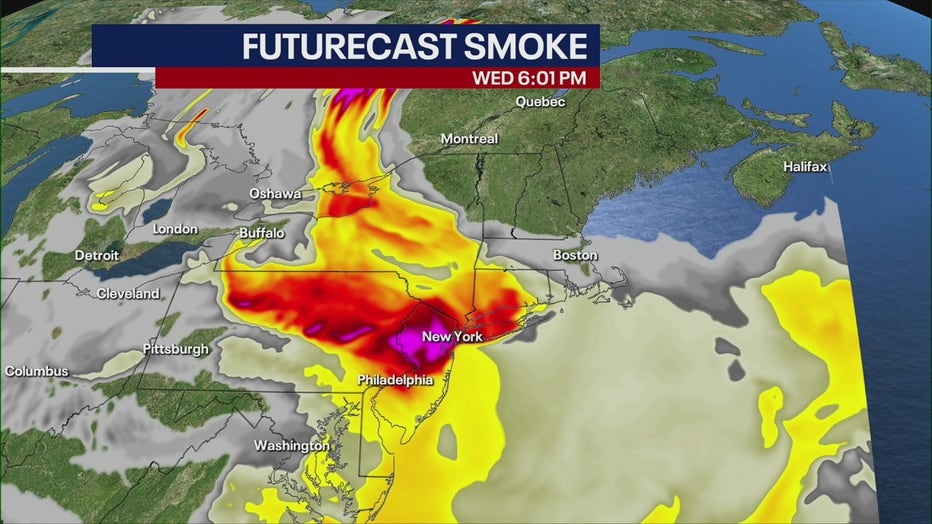New York smoke forces ground stop, delay at LaGuardia and Newark airports

Air quality affects airports
The FAA issued a ground stop at LaGuardia airport on Wednesday. FOX 5 NY's Arthur Chi'en has the details.
NEW YORK CITY - As bad as the NYC air quality was Wednesday morning, all three of NYC's airports were operating normally. But as the skies darkened, that changed.
By early afternoon, the FAA ordered ground stops at LaGuardia Airport in Queens and Newark Liberty International Airport in New Jersey, with NYC-bound flights being held on the ground at their airport of origin.
The FAA sent out a message saying, "Boston to the New York metro area to Philadelphia and the DC Metro area, are all experiencing some smoke."
Smoke and haze from wildfires in Canada continue to blitz countless airports in the Northeast, severely limiting visibility. Air travel conditions deteriorated rapidly as the day went on.
"This is the worst I've ever seen in my lifetime as far as smoke," Kyle Bailey, an aviation analyst and pilot, told FOX 5. "It's a very, very rare occurrence. Normally, every couple of years we'll see this, but never to this extent."
As the FAA slowed or stopped flight traffic, delays at Newark were averaging 82 minutes. 2 hours at LaGuardia for incoming flights.
LaGuardia Airport Status
- According to the FAA, LaGuardia is in a ground delay due to low visibility.
- Arrivals are delayed almost two hours, with times expected to increase.
- Departures are also delayed an average of 45 minutes, with times expected to increase.
Newark Airport Status
- According to the FAA, Newark Airport is in a ground delay.
- The average delay is over 80 minutes due to low visibility.
JFK Airport Status
- Arrivals and departures at JFK are experiencing delays, the airport tweeted.
- There are no ground stops or delays at the moment, according to the FAA.
- RELATED: NYC air quality: Forecast, outlook for Wednesday and beyond
- RELATED: NYC in code red ‘unhealthy’ air quality as Canadian wildfire smoke pours into Northeast
How does wildfire smoke affect your health?

Wildfires cause 'unhealthy' NYC air quality
Canada is dealing with a series of intense wildfires that have spread from the western provinces to Quebec, with hundreds of forest fires burning. The smoke has traveled into the United States, resulting in a number of air quality alerts issued since May.
Wildfire smoke is a complex mixture of gases, particles, and water vapor that contains multiple pollutants that can get into the lungs and bloodstream.
There is no evidence of a safe level of exposure to some of the pollutants, meaning that smoke can impact your health even at very low levels.

Inhaling smoke from wildfires can cause headaches, sore and watery eyes, nose, throat, and sinus irritation, chest pains, heart palpitations and more.
Who should be careful?
Exposure to elevated fine particle pollution levels can affect the lungs and heart.
- RELATED: NYC health alert over Canadian wildfire smoke
- RELATED: Weather Center
The air quality alerts caution "sensitive groups," a big category that includes children, older adults, and people with lung diseases, such as asthma and chronic obstructive pulmonary disease.
Kids, who often are encouraged to go out and play, "are more susceptible to smoke for a number of reasons," said Laura Kate Bender, the lung association's National Assistant Vice President, healthy air. "Their lungs are still developing, they breathe in more air per unit of body weight."
No one is immune.
What can you do for now?
It's a good time to put off that yard work and outdoor exercise. If you go out, consider wearing an N95 mask to reduce your exposure to pollutants.

Stay inside, keeping your doors, windows and fireplaces shut. It's recommended that you run the air conditioning on a recirculation setting.
When will conditions improve?
Conditions are expected to worsen Wednesday afternoon and evening and may not markedly improve for a couple of days.



